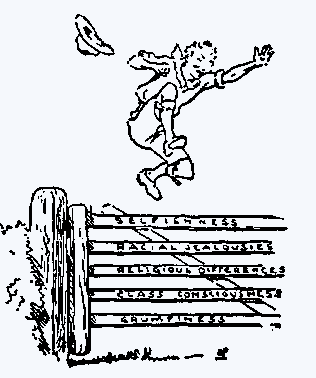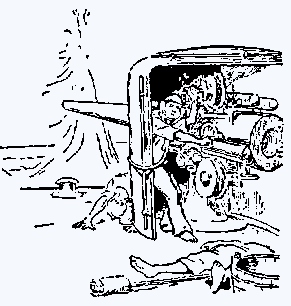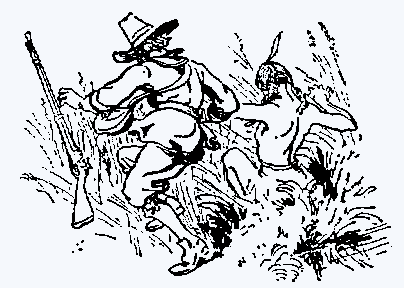
Camp Fire Yarn No. 21
SELF-DISCIPLINE
Honour • Obedience Courage • Cbeeriness
The true knight placed his honour before all things. It was sacred. A man who is honourable is always
to be trusted. He will never do a dishonourable action, such as telling an untruth or deceiving his superiors or employers,
or those under his orders, and always commands the respect of his fellow-men.
A captain sticks to the ship till the last. Why? She is only a lump of iron and wood and his life is
as valuable as that of any of the women and children on board. But he makes everybody get away safely before he attempts to
save his more valuable life. Why? Because the ship is his ship, and he has been taught that it is his duty to stick to it,
and he considers it would be dishonourable of him to do otherwise-so he puts honour before safety.
So also a Scout should value his honour most of anything.
Lord Kitchener said to the Boy Scouts: "There is one thought I would like to impress upon you all-ONCE
A SCOUT, ALWAYS A SCOUT." By this he meant that when you are grown up you must still carry out what you learned as a Scout-and
especially that you will go on being honourable and trustworthy.
FAIR PLAY
Play fair yourself and insist on fair play in others.
If you see a big bully going for a small or weak boy, you stop him because it is not "fair play". If
a prize fighter, in fighting another, knocks him down, he must not hit him while he is down.
The point is that "fair play" is an old idea of chivalry that has come down to us from the knights
of old, and we must always keep up that idea.
HONESTY
Honesty is a form of honour. An honourable man can be trusted with any amount of money or other valuables
with the certainty that he will not steal it.
Cheating at any time is a sneaking, underhand thing to do.
When you feel inclined to cheat in order to win a game, or feel very distressed when a game in which
you are playing is going against you, just say to yourself, "After all, it is only a game. It won't kill me if I do lose.
One can't win always, though I will stick to it in case of a chance coming."
If you keep your head in this way, you will very often find that you win after all from not being over
anxious or despairing. And don't forget, whenever you do lose a game, if you are a true Scout, you will at once cheer the
winning team or shake hands with and congratulate *he fellow who has beaten you.
This rule is carried out in all games and competitions among Boy Scouts.
"O God, help me to win, but if I can't win, make me a good loser."
LOYALTY
Our highest loyalty is to God; we can show that by carrying out our duties to the Church to which we
belong, and by keeping our Promise as Scouts.
Loyalty was, above all, one of the distinguishing points about the knights. They were always devotedly
loyal to their King and to their country, and were always ready and eager to die in their defence. In the same way a follower
of the knights should be loyal to his country and to every one who is above him, whether his officers or employers, and he
should stick to "them through thick and thin as part of his duty. If he does not intend to be loyal, he will, if he has any
honour and manliness in him, resign his place.
He should also be equally loyal to his family and his friends and should support them in evil times
as well as in good times.
Loyalty to duty was shown by the Roman soldier of old who stuck to his post when the city of Pompeii
was overwhelmed with ashes and lava from the volcano Vesuvius. His remains are still there, his hand covering his mouth and
nose to prevent the suffocation which in the end overcame him.
DUTY BEFORE ALL
The name and fame of Jack Cornwell are known to every boy in Britain as the lad who in the great sea
fight off Jutland in 1916 stuck to his gun aboard the Chester when all the gun's crew were killed or wounded and he might
have got away under cover.

He was badly wounded himself-but in the responsible work of sight-setter his duty was to be at his
post by the gun, and there he stayed for twenty minutes under heavy fire, in case he should be wanted.
At the end of the fight, after the Chester had come successfully through her tremendous contest with
three German cruisers, the only unwounded man of the gun's crew said to him, "Well done, lad. You stuck it out well. Lucky
you weren't wounded."
"Well! I am wounded-here in the chest. But did we win?"
"Yes, my lad."
The boy sank down fainting. He lingered a few days in a hospital and died of his wound, but satisfied-knowing
that he had done his duty. He had "stuck to it", as every Scout should.
DISCIPLINE AND OBEDIENCE
Discipline and obedience are as important as bravery for Scouts and for soldiers.
The Birkenhead was a transport ship carrying troops. She had on board 630 soldiers with their families
and 130 seamen. Near the Cape of Good Hope one night she ran on to some rocks, and began to break up.
The soldiers were at once paraded on deck. Some were ordered to get out the boats, and to put the women
and children into them, and others were told to get the horses up out of the hold, and to lower them overboard into the sea,
so that they might have a chance to swim ashore. When this had all been done, it was found that there were not enough boats
to take the men, and so the men were ordered to remain in their ranks.
Then the ship broke in half and began to go down. The captain shouted to the men to jump over and save
themselves, but the officer in charge, Colonel Seaton, said, "No, keep your ranks." For he saw that if they swam to the boats,
and tried to get in, they would probably sink them too.
So the men kept their ranks, and as the ship rolled over and sank, they gave a cheer and went down
with her. Out of the whole 760 on board, only 192 were saved, but even those would probably have been lost had it not been
for the discipline and self-sacrifice of the others.
A British training ship, the Fort Jackson, full of boy-sailors, was run into by a steamer, but just
as in the Birkenhead there was no panic or crying out. The boys fell in quickly on parade, put on their life-belts, and faced
the danger calmly and well. And not a life was lost.
HUMILITY
Humility, or being humble, was one of the things which was practised by the knights. Although they
were generally superior to other people in fighting or campaigning, they never allowed themselves to swagger about it. So
don't swagger.
And don't imagine that you have rights in this world except those that you earn for yourself. You have
the right to be believed, if you earn it by always telling the truth, and you have the right to go to prison if you earn it
by thieving. There are lots of men who go about howling about their rights who have never done anything to earn any rights.
Do your duty first, and you will get your rights afterwards.

COURAGE
Very few men are born brave, but any man can make himself brave if he tries-and especially if he begins
trying when he is a boy.
The brave man dashes into danger without hesitation, when a less brave man is inclined to hang back.
It is very like bathing. A lot of boys will come to a rivet to bathe, and will cower shivering on the bank, wondering how
deep the water is, and whether it is very cold -but the brave one will run through them and take his header into the water,
and will be swimming about happily a few seconds later.
The thing is, when there is danger before you, don't stop and look at it-the more you look at it the
less you will like it-but take the plunge, go boldly in at it, and it won't be half as bad as it looked, when you are once
in it.
FORTITUDE
The knights were men who never said "die" until they were dead. They were always ready to stick it
out till the end. But it is a very common fault with men to give in to trouble or fear long before there is any necessity.
Many of them give up working hard because they don't get success all at once; probably if they stuck to it a little longer,
success would come. A man must expect hard work at first to have success later.
Some of you may have heard the story of the two frogs. If you have not, here it is:
Two frogs were out for a walk one day, and they came to a big bowl of cream. In looking into it they
both fell in.
One said: "This is a new kind of water to me. How can a fellow swim in stuff like this? It is no use
trying." So he sank to the bottom and was drowned because he had no pluck.
But the other was a more manly frog, and he struggled to swim, using his arms and legs as hard as he
could to keep himself afloat. Whenever he felt he was sinking he struggled harder than ever, and never gave up hope.
At last, just as he was getting so tired that he thought he must give it up, a curious thing happened.
By his hard work with his arms and legs he had churned up the cream so much that he suddenly found himself sitting all safe
on a pat of butter!
So when things look bad, just smile and sing to yourself, as the thrush sings: "Stick to it, stick
to it, stick to it," and you will come through all right.
A very great step to success is to be able to stand disappointments.
CHEERINESS
The knights laid great stress on never being out of temper. They thought it bad form to lose their
temper and to show anger.
Captain John Smith was himself a cheerful man. In fact, towards the end of his life two boys to whom
he told his adventures, wrote them down in a book, but said that they found great difficulty in hearing all that he said,
because he roared with laughter at his own descriptions of his troubles. But it is very certain that had he not been a cheery
man, he never could have come through half the dangers with which he was faced at different times in his career.
Over and over again he was made prisoner by his enemies- sometimes savage enemies-but he managed always
to captivate them with his pleasant manner, and become friends with them, so that they let him go, or did not trouble to catch
him when he made his escape.
If you do your work cheerfully, your work becomes much more of a pleasure to you. And also, if you
are cheerful it makes other people cheerful as well, which is part of your duty as a Scout. Sir J. M. Barrie wrote: "Those
who bring sunshine to the lives of others cannot
keep happiness from themselves." If you make other people happy, you make yourself happy.
And I'll tell you a secret about making your work easy, whatever it is. If your work is lessons in
school, or doing jobs for an employer, or in a workshop, or an office, you can, if you like, get very bored and tired of it.
If you keep thinking of what you will do to enjoy yourself when you get out and how much better off other fellows are who
don't have to work, then you will get to hate your work-it will hang on you all the time, you will do it badly, and you won't
get on. But if you take the other line and see what your work will lead to in the end and the good it will bring to yourself
or others for whom you are making things, then you will go at it eagerly, and very soon you will find that instead of hating
it you will love it, and keep doing it better and better all the time.

If you are in the habit of taking things cheerfully, you will very seldom find yourself in serious
trouble, because if a difficulty or annoyance or danger seems great, you will, if you are wise, force yourself to laugh at
it-although I will allow it is very difficult to do so at first. Still, the moment you do laugh, most of the difficulty seems
to disappear at once, and you can tackle it quite easily.
GOOD TEMPER
Good temper can be attained by a boy who wants to have it. It will help him in every game under the
sun, and more especially in difficulty and danger, and will often keep him in a situation where a short-tempered fellow gets
turned out, or leaves in a huff.
Bad language and swearing are used, like smoking, by boys who I want to try to show off how manly they
are, but it only makes them look like fools. Generally, a man who swears is a man easily upset, who loses his head in a difficult
situation. He is not, therefore, to be depended upon.
You want to be quite undisturbed under the greatest difficulties; so when you find yourself particularly
anxious, or excited, or angry) don't swear-force yourself to smile, and it will set you right in a moment.
Captain John Smith, who neither smoked nor swore, had a way of dealing with swearers, which is also
adopted by Scouts. He says in his diary that when his men were cutting down trees, the axes blistered their tender fingers,
so that at about every third blow a loud oath would drown the echo of the axe.
To remedy this he devised a plan of having every man's oath noted down, and at night, for every oath,
he had a can of water poured down the wearer's sleeve, "with which an offender was so washed that a man would scarce hear
an oath for a week". | 
